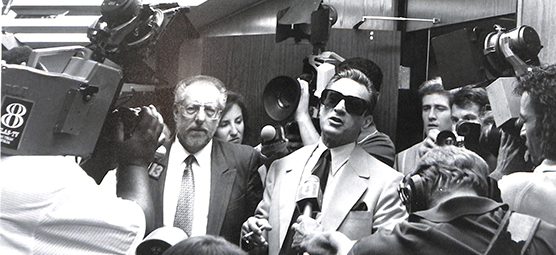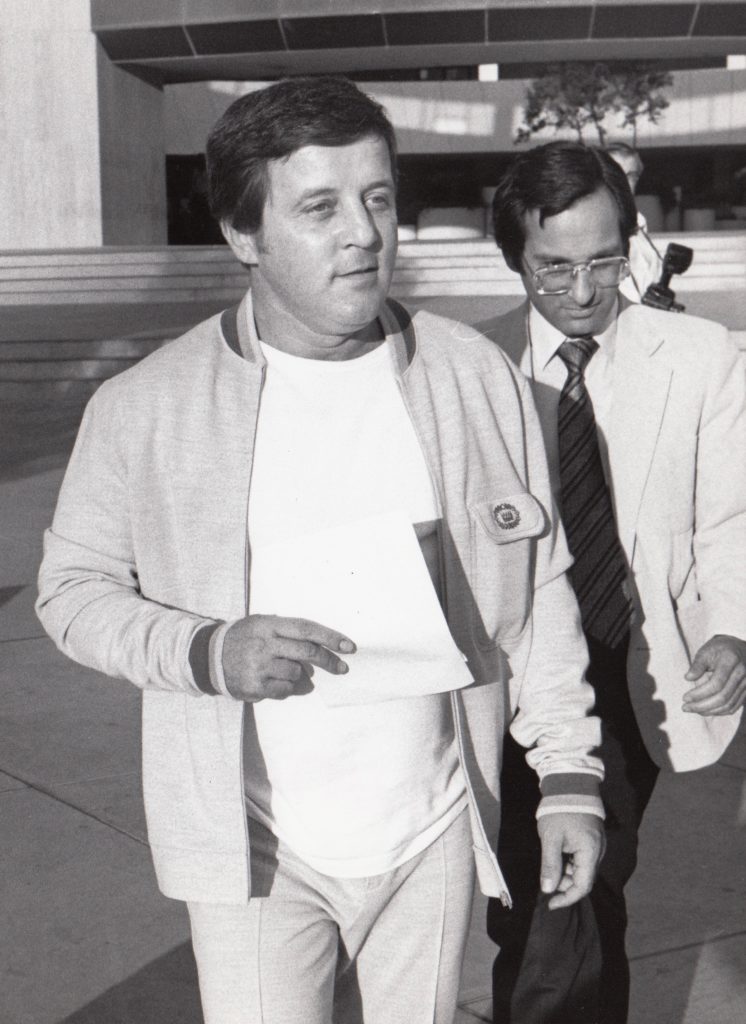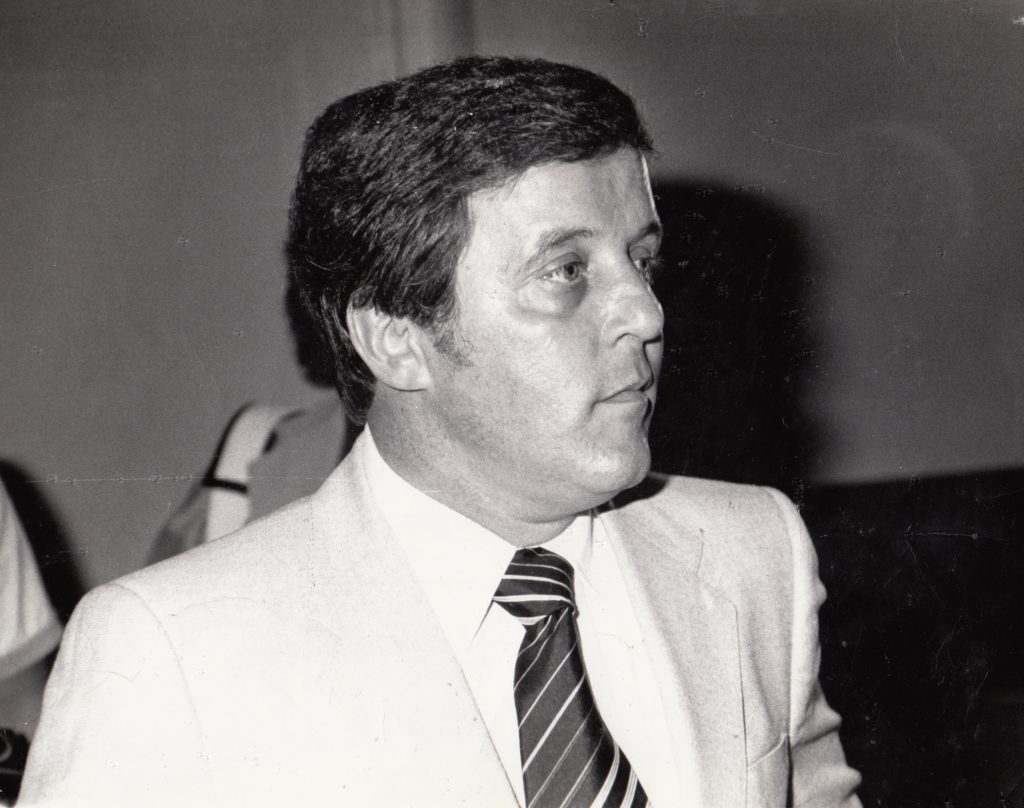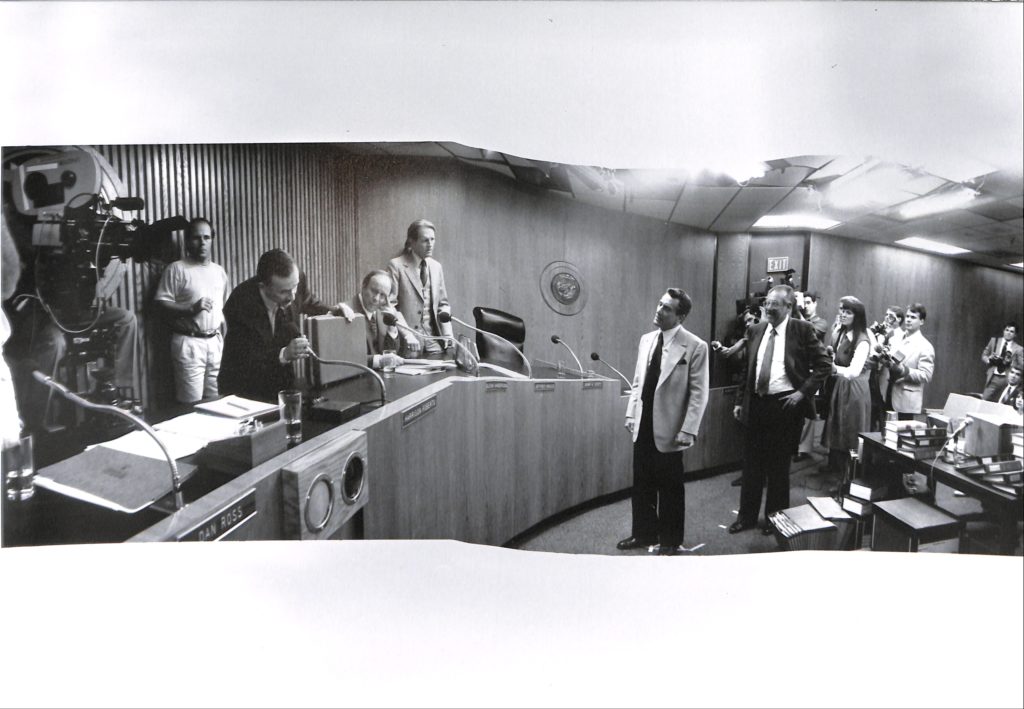
Separating fact from fiction in ‘Casino’

Ace Rothstein (Robert De Niro) is surrounded by the press at a Nevada Gaming Commission meeting portrayed in Casino. Rothstein’s lawyer, Oscar Goodman (played by Goodman himself), stands by his side. Photo courtesy of Oscar Goodman.
Though the movie Casino was released more than 22 years ago, it still serves as a reference point for those hoping to understand what real Las Vegas mobsters were like when they were a sinister fixture in the news.
But most movies based on true stories, including Casino, twist the facts for dramatic effect and to compress long histories into a watchable timeframe.
What you see in Casino isn’t exactly the way things were. Case in point: the death of the Spilotro brothers, two mobsters originally from Chicago.
The way the movie portrays it, the brothers — or at least the fictional characters representing Anthony and Michael Spilotro — are beaten with baseball bats in a cornfield and shoved into a shallow grave while still alive.

Not true.
In his 2009 book Family Secrets: The Case That Crippled the Chicago Mob, journalist Jeff Coen details what really happened. Coen covered the Family Secrets trial for the Chicago Tribune. That 2007 trial resulted in convictions and revealed details that weren’t publicly known when the movie came out more than a decade earlier.
In the 1995 movie, it was baseball bats in a cornfield. But according to trial testimony, the Spilotros were lured to a residence near O’Hare International Airport in Bensenville, a subdivision of “modest homes,” and were beaten to death in the basement. (At the trial, one of the killers, Mob turncoat Nick Calabrese, said he could not recall which house it was.)
Anthony and his brother, Michael, a part-time actor and owner of the Chicago restaurant and Mob hangout Hoagie’s, went to the home in June 1986 believing they were to be promoted within the Outfit.
Although the brothers were suspicious, refusing to go was unthinkable.
When the Spilotros got to the basement, about 15 mobsters pounced on them. Michael had brought a pocket-sized .22-caliber handgun but could not get to it. Anthony was heard asking if he could say a prayer but was swarmed.
In addition to breaking Michael’s nose, the attackers inflicted blunt force injuries over his entire body. They severely bruised Anthony’s face, left temple and chest.
Anthony, 48, had blood in his trachea, lungs and nasal passages and hemorrhaging in the muscles of the larynx. The 41-year-old Michael had a fractured Adam’s apple.
Neither man’s skin was broken, indicating the killers did not use a heavy object such as a baseball bat. The brothers were beaten with fists, knees and feet, according to a pathologist at the trial.

The Spilotros were dead when buried in an Enos, Indiana, cornfield about 100 miles south of the murder house. The brothers were placed in a five-foot grave in only their underwear, one on top of the other.
The cornfield is near land that Outfit boss Joseph “Joey Doves” Aiuppa used for hunting, according to Coen. A farmer discovered the grave, thinking someone had buried a deer. The Spilotros were identified by dental X-rays provided by a third brother, Patrick Spilotro, a dentist.
Why did this happen to Anthony and Michael Spilotro? Mob higher-ups felt the two had to be silenced.
Since the early 1970s, Anthony Spilotro had overseen street rackets in Las Vegas for the Chicago Outfit. He also was keeping an eye on Frank “Lefty” Rosenthal, a Chicago bookie handling the skim in Las Vegas for Midwestern Mob bosses.
Ultimately, though, news stories about Spilotro’s violent criminal activities, and his affair with Rosenthal’s wife, a former showgirl at the Tropicana hotel-casino, led to the gruesome outcome in that Bensenville basement.
Anthony Spilotro’s high-profile legal problems were jeopardizing the Outfit’s Las Vegas cash cow, prompting Aiuppa to order him “knocked down.” Michael Spilotro, facing a trial on extortion charges, had to go, too.

That terrifying outcome is not the only place where Casino misses the mark factually. In another example among many from the film, an animated Kansas City mobster pops off in an Italian grocery about the Las Vegas skim while federal authorities listen to his profanity-laced rant through a bug planted in a vent.
In reality, law enforcement authorities learned about the Las Vegas skim while eavesdropping on a conversation between members of the Civella crime family at a bugged back table in Kansas City’s Villa Capri pizzeria. Unlike the movie, there was no humorous scolding mom at the now-demolished Villa Capri nagging her mobster son about his vulgar language.
The only ones at the table were sinister Mob figures, behaving like real-life conspiratorial gangsters, not colorful movie characters.
Larry Henry is a veteran print and broadcast journalist. He served as press secretary for Nevada Governor Bob Miller, and was political editor at the Las Vegas Sun and managing editor at KFSM-TV, the CBS affiliate in Northwest Arkansas. Henry taught journalism at Haas Hall Academy in Bentonville, Arkansas, and now is the headmaster at the school’s campus in Rogers, Arkansas. The Mob in Pop Culture blog appears monthly.
Feedback or questions? Email blog@themobmuseum.org





